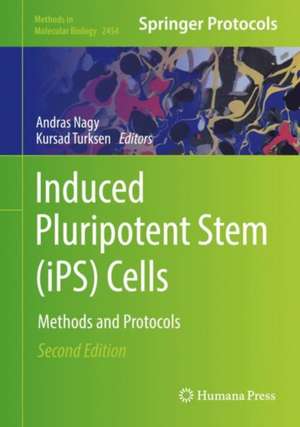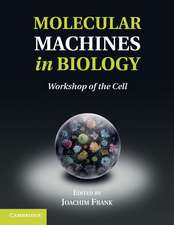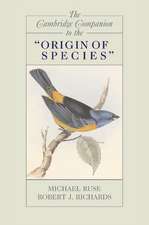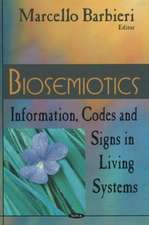Induced Pluripotent Stem (iPS) Cells: Methods and Protocols: Methods in Molecular Biology, cartea 2454
Editat de Andras Nagy, Kursad Turksenen Limba Engleză Paperback – 24 iun 2023
Comprehensive and up-to-date, Induced Pluripotent Stem (iPS) Cells: Methods and Protocols, Second Edition aims to arm stem cell biologists, both novice and expert, with invaluable protocols that are currently being used in various laboratories around the world.
| Toate formatele și edițiile | Preț | Express |
|---|---|---|
| Paperback (2) | 702.19 lei 38-44 zile | |
| Springer – 27 mar 2019 | 702.19 lei 38-44 zile | |
| Springer Us – 24 iun 2023 | 1144.20 lei 6-8 săpt. | |
| Hardback (2) | 1414.74 lei 3-5 săpt. | |
| Springer – 29 dec 2015 | 1414.74 lei 3-5 săpt. | |
| Springer Us – 23 iun 2022 | 1587.88 lei 6-8 săpt. |
Din seria Methods in Molecular Biology
- 9%
 Preț: 791.63 lei
Preț: 791.63 lei - 23%
 Preț: 598.58 lei
Preț: 598.58 lei - 20%
 Preț: 882.98 lei
Preț: 882.98 lei -
 Preț: 252.05 lei
Preț: 252.05 lei - 5%
 Preț: 802.70 lei
Preț: 802.70 lei - 5%
 Preț: 729.61 lei
Preț: 729.61 lei - 5%
 Preț: 731.43 lei
Preț: 731.43 lei - 5%
 Preț: 741.30 lei
Preț: 741.30 lei - 5%
 Preț: 747.16 lei
Preț: 747.16 lei - 15%
 Preț: 663.45 lei
Preț: 663.45 lei - 18%
 Preț: 1025.34 lei
Preț: 1025.34 lei - 5%
 Preț: 734.57 lei
Preț: 734.57 lei - 18%
 Preț: 914.20 lei
Preț: 914.20 lei - 15%
 Preț: 664.61 lei
Preț: 664.61 lei - 15%
 Preț: 654.12 lei
Preț: 654.12 lei - 18%
 Preț: 1414.74 lei
Preț: 1414.74 lei - 5%
 Preț: 742.60 lei
Preț: 742.60 lei - 20%
 Preț: 821.65 lei
Preț: 821.65 lei - 18%
 Preț: 972.30 lei
Preț: 972.30 lei - 15%
 Preț: 660.49 lei
Preț: 660.49 lei - 5%
 Preț: 738.41 lei
Preț: 738.41 lei - 18%
 Preț: 984.92 lei
Preț: 984.92 lei - 5%
 Preț: 733.29 lei
Preț: 733.29 lei -
 Preț: 392.60 lei
Preț: 392.60 lei - 5%
 Preț: 746.26 lei
Preț: 746.26 lei - 18%
 Preț: 962.66 lei
Preț: 962.66 lei - 23%
 Preț: 860.22 lei
Preț: 860.22 lei - 15%
 Preț: 652.64 lei
Preț: 652.64 lei - 5%
 Preț: 1055.50 lei
Preț: 1055.50 lei - 23%
 Preț: 883.87 lei
Preț: 883.87 lei - 5%
 Preț: 1141.13 lei
Preț: 1141.13 lei - 19%
 Preț: 491.89 lei
Preț: 491.89 lei - 5%
 Preț: 1038.86 lei
Preț: 1038.86 lei - 5%
 Preț: 524.16 lei
Preț: 524.16 lei - 18%
 Preț: 2122.34 lei
Preț: 2122.34 lei - 5%
 Preț: 1299.23 lei
Preț: 1299.23 lei - 5%
 Preț: 1339.12 lei
Preț: 1339.12 lei - 18%
 Preț: 1390.26 lei
Preț: 1390.26 lei - 18%
 Preț: 1395.63 lei
Preț: 1395.63 lei - 18%
 Preț: 1129.65 lei
Preț: 1129.65 lei - 18%
 Preț: 1408.26 lei
Preț: 1408.26 lei - 18%
 Preț: 1124.92 lei
Preț: 1124.92 lei - 18%
 Preț: 966.27 lei
Preț: 966.27 lei - 5%
 Preț: 1299.99 lei
Preț: 1299.99 lei - 5%
 Preț: 1108.51 lei
Preț: 1108.51 lei - 5%
 Preț: 983.76 lei
Preț: 983.76 lei - 5%
 Preț: 728.16 lei
Preț: 728.16 lei - 18%
 Preț: 1118.62 lei
Preț: 1118.62 lei - 18%
 Preț: 955.25 lei
Preț: 955.25 lei - 5%
 Preț: 1035.62 lei
Preț: 1035.62 lei
Preț: 1144.20 lei
Preț vechi: 1395.36 lei
-18% Nou
Puncte Express: 1716
Preț estimativ în valută:
218.97€ • 237.77$ • 183.93£
218.97€ • 237.77$ • 183.93£
Carte tipărită la comandă
Livrare economică 22 aprilie-06 mai
Preluare comenzi: 021 569.72.76
Specificații
ISBN-13: 9781071621219
ISBN-10: 1071621211
Ilustrații: XXIII, 835 p. 37 illus.
Dimensiuni: 178 x 254 mm
Greutate: 1.46 kg
Ediția:2nd ed. 2022
Editura: Springer Us
Colecția Humana
Seria Methods in Molecular Biology
Locul publicării:New York, NY, United States
ISBN-10: 1071621211
Ilustrații: XXIII, 835 p. 37 illus.
Dimensiuni: 178 x 254 mm
Greutate: 1.46 kg
Ediția:2nd ed. 2022
Editura: Springer Us
Colecția Humana
Seria Methods in Molecular Biology
Locul publicării:New York, NY, United States
Cuprins
- Human Induced Pluripotent Stem Cell (iPSC) Handling Protocols: Maintenance, Expansion, and Cryopreservation. - Generation of Induced Pluripotent Stem Cells from Human Bone Marrow–Derived Mesenchymal Stem Cells. - Analysis of Clonal Composition in Human iPSC and ESC and Derived 2D and 3D Differentiated Cultures. - Culturing Human Pluripotent Stem Cells on Micropatterned Silicon Surfaces. - Porcine iPSC Generation: Testing Different Protocols to a Successful Application. - Efficient High-Density hiPSCs Expansion in Simple Dialysis Device. - Expanding the Differentiation Potential of Already-Established Pluripotent Stem Cells. - Generation of Quiescent Cardiac Fibroblasts Derived from Human Induced Pluripotent Stem Cells. - Inductive Coculture Differentiation of Induced Pluripotent Stem Cells into Cardiomyocytes. - 3D Microwell Platform for Cardiomyocyte Differentiation of Human Pluripotent Stem Cells. - Scalable Generation of Human Induced Pluripotent Stem Cell-Derived Cardiomyocytes. - Application of Human Induced Pluripotent Stem Cell Technology for Cardiovascular Regenerative Pharmacology. - Efficient and Safe Method of Generating Induced Pluripotent Stem Cells from Human Skin Fibroblasts and Subsequent Differentiation into Functional Cardiomyocytes. - An Optical-Flow-Based Method to Quantify Dynamic Behavior of Human Pluripotent Stem Cell-Derived Cardiomyocytes in Disease Modeling Platforms. - Production of Innervated Skeletal Muscle Fibers Using Human Induced Pluripotent Stem Cells. - Generation of Human Neural Progenitors from Blood Samples by Interrupted Reprogramming. - Robust and Highly Efficient Protocol for Differentiation of Human Pluripotent Stem Cells into Mesenchymal Stem Cells. - The Development of Tissue Engineering Scaffolds Using Matrix from iPS-Reprogrammed Fibroblasts. - 3D Organoid Culture Using Skin Keratinocytes Derived from Human Induced Pluripotent Stem Cells. - Pluripotent Stem Cell Differentiation Toward Functional Basal Stratified Epithelial Cells. - Serum-Free Production of Three-Dimensional Hepatospheres from Pluripotent Stem Cells. - The Differentiation of Human Induced Pluripotent Stem Cells into Podocytes In Vitro. - A Method for Encapsulation and Transplantation into Diabetic Mice of Human Induced Pluripotent Stem Cells (hiPSC)-Derived Pancreatic Progenitors. - Highly Efficient Differentiation of Human Pluripotent Stem Cells into Pancreatic Progenitors Co-expressing PDX1 and NKX6.1. - Derivation of Three-Dimensional Human Induced Pluripotent Stem Cell-Derived Vocal Fold Mucosa for Clinical and Pharmacological Applications. - Generation of Human Induced Pluripotent Stem Cells Using Endothelial Progenitor Cells Derived from Umbilical Cord Blood and Adult Peripheral Blood. - Development of a Blood–Brain Barrier Permeability Assay Using Human Induced Pluripotent Stem Cell Derived Brain Endothelial Cells. - Revised “hPSC-Sac Method” for Simple and Efficient Differentiation of Human Pluripotent Stem Cells to Hematopoietic Progenitor Cells. - Efficient Generation of iPSC-Derived Hematoendothelial Progenitors and Specification Toward T cell Lineage. - Derivation and Characterization of Mesenchymal Stem Cells from iPS Cells. - Human Pluripotent Stem Cell Differentiation to Microglia. - Human Induced Pluripotent Stem Cell-Derived Microglia (hiPSC-Microglia). - Isolation and Culture of Human-Induced Pluripotent Stem Cell-Derived Cerebral Organoid Cells. - A Simple Method for Generating, Clearing, and Imaging Pre-vascularized 3D Adipospheres Derived from Human iPS Cells. - A Method for In Vitro Fabrication of Hybrid Bone/Cartilage Tissue Using Mouse Induced Pluripotent Stem Cells. - Differentiation of Human Induced Pluripotent Stem Cells (hiPSC) into Endothelial-Type Cells and Establishment of an In Vitro Blood-Brain Barrier Model. - CRISPR/Cas9-Mediated Introduction of Specific Heterozygous Mutations in Human Induced Pluripotent Stem Cells. - CRISPR/Cas9–Mediated Gene Knockout and Knockin Human iPSCs. - Generation of Monoclonal iPSC Lines with Stable Cas9 Expression and High Cas9 Activity. - CRISPR/Cas9-Mediated Genome Editing to Generate Clonal iPSC Lines. - CRISPR/Cas9 Ribonucleoprotein Complex-Mediated Efficient B2M Knockout in Human Induced Pluripotent Stem Cells (iPSCs). - Embryonal Carcinoma and Glioblastoma Cell Lines Derived from Monkey Induced Pluripotent Stem Cells. - Methods for Isolation and Reprogramming of Various Somatic Cell Sources into iPSCs. - The Characteristics of Human iPS Cells and siRNA Transfection Under Hypoxia. - mRNA-Based Reprogramming Under Xeno-Free and Feeder-Free Conditions. - Non-modified RNA-Based Reprogramming of Human Dermal Fibroblasts into Induced Pluripotent Stem Cells. - Efficient Induction of Primate iPS Cells Using a Combination of RNA Transfection and Chemical Compounds. - Generation and Cultivation of Transgene-Free Macaque and Baboon iPSCs Under Chemically Defined Conditions. - Generation of Marmoset Monkey iPSCs with Self-Replicating VEE-mRNAs in Feeder-Free Conditions. - Differentiation of Human Induced Pluripotent Stem Cells into Definitive Endoderm Using Simple Dialysis Culture Device. - Detecting and Modulating ER Stress to Improve Generation of Induced Pluripotent Stem Cells. - Gene Editing in Human Induced Pluripotent Stem Cells Using Doxycycline-Inducible CRISPR-Cas9 System. - Derivation of Clinical-Grade Induced Pluripotent Stem Cell Lines from Erythroid Progenitor Cells in Xenofree Conditions. - Generation of Murine Induced Pluripotent Stem Cells through Transposon-Mediated Reprogramming. - Human Pluripotent Stem Cells for High-Throughput Drug Screening and Characterization of Small Molecules. - Correction to: Human Pluripotent Stem Cells for High-Throughput Drug Screening and Characterization of Small Molecules.
Textul de pe ultima copertă
This extensive new edition presents protocols reflecting the great strides made in the study of induced pluripotent stem (iPS) cells. The collection explores new and improved methods for the generation, expansion, and maintenance of iPS cells from different tissue types, characterization of their differentiation pathways along different lineages, and their potential utility in tissue repair and regeneration. Written for the highly successful Methods in Molecular Biology series, chapters include introductions to their respective topics, lists of the necessary materials and reagents, step-by-step, readily reproducible laboratory protocols, and tips on troubleshooting and avoiding known pitfalls.
Comprehensive and up-to-date, Induced Pluripotent Stem (iPS) Cells: Methods and Protocols, Second Edition aims to arm stem cell biologists, both novice and expert, with invaluable protocols that are currently being used in various laboratories around the world.
Caracteristici
Includes cutting-edge techniques Provides step-by-step detail essential for reproducible results Contains key implementation advice from the experts







